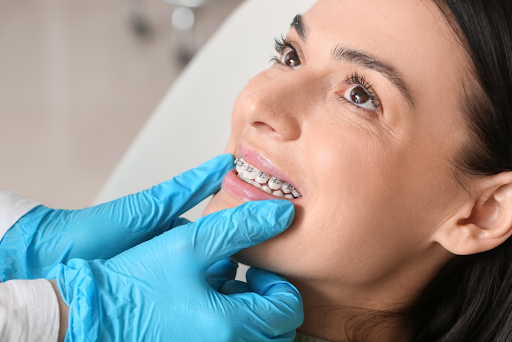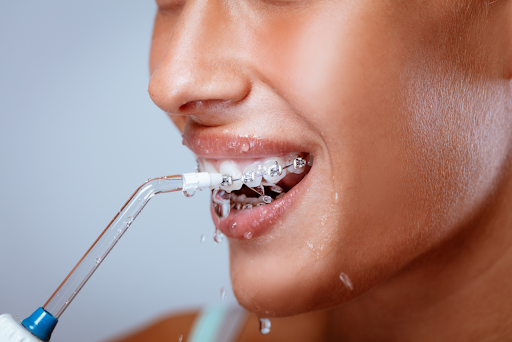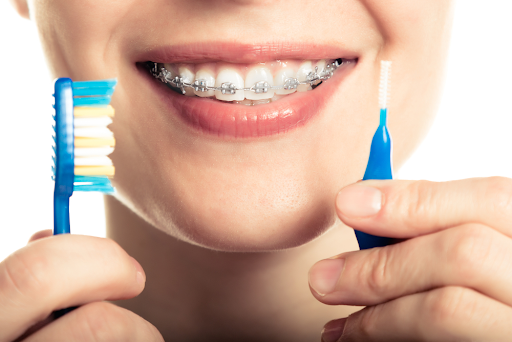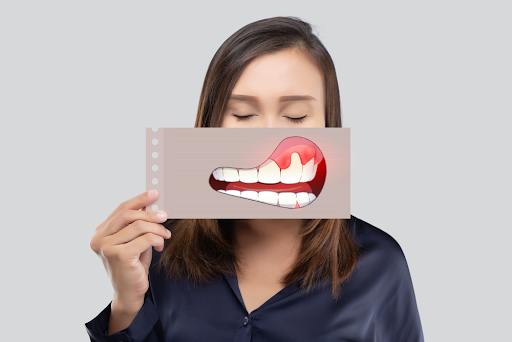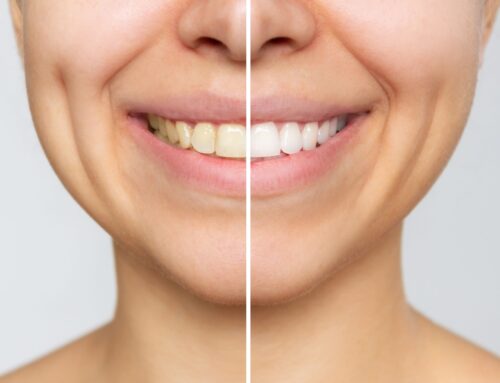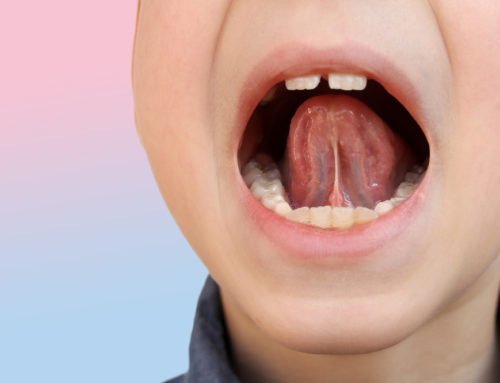Managing Swollen Gums Braces Discomfort: Effective Relief Strategies
If swollen gums braces are causing discomfort or swelling, relief is at hand. In this guide, we provide practical tips to reduce swelling and prevent future irritation. Discover simple home remedies and essential hygiene practices to keep your gums healthy throughout your orthodontic journey.
Understanding Gum Swelling with Orthodontic Braces
When you wear braces, your gums may feel like they’ve declared a rebellion. Swollen gums, one of the most common byproducts of braces, can occur due to inflammation, gingival enlargement, or an increase in gum cells. Teeth movement during orthodontic treatment applies pressure that can lead to gum inflammation.
Furthermore, braces and plaque buildup can irritate your gums, causing overgrowth of gum tissue. Maintaining healthy gums while wearing braces can be challenging, but using mouthwash can be a significant part of your oral hygiene routine. Mouthwash can reach areas in your mouth that your toothbrush might miss, especially around brackets and wires. Fluoride-based mouthwashes not only strengthen tooth enamel but also promote healthier gums. Swollen gums can typically subside within a week of getting braces or a few days after an adjustment.
Why Braces Cause Gum Inflammation
Braces and other orthodontic appliances have a knack for getting up close and personal with your gums. Their design and proximity to the gums can contribute to gum swelling. Braces can trap food particles and make it challenging to clean along the gum line effectively. This can lead to potential plaque buildup and gum disease.
Additionally, braces rubbing against the gums can cause inflammation and lead to an increase in gum tissue, making swollen gums worse. While braces work relentlessly to straighten your teeth, they can sometimes cause annoying problems.
Tooth Movement and Gum Sensitivity
During orthodontic treatment, your teeth shifting around can cause considerable discomfort in your mouth. As your teeth adjust to their new positions, so do the soft tissues of the gums, often resulting in soreness and swelling. It’s a common side effect, especially after an adjustment.
Challenges in Maintaining Oral Hygiene with Braces
Maintaining oral hygiene while wearing braces can sometimes be quite challenging, almost like navigating a maze. The complex structure of braces can trap food debris between the tooth and the gum line, leading to dental decay and gum swelling, which may result in a dental abscess if left untreated.
If oral hygiene is neglected, plaque can accumulate around braces, heightening the risk of gum disease. Therefore, maintaining a consistent daily oral health regimen is critical when wearing braces. After all, achieving a perfect smile shouldn’t come at the cost of your gum health.
Strategies to Alleviate Swollen Gums While Wearing Braces
Thankfully, dealing with swollen gums while wearing braces can be quite simple. There are several strategies you can adopt to soothe your gums and keep them healthy.
Effective Cleaning Techniques for Braces
Maintaining good oral hygiene is the primary defense against swollen gums. To avoid swollen gums, brush gently twice a day with either soft-bristled or specialty orthodontic toothbrushes, which can mitigate plaque buildup and reduce the risk of swollen gums. Remember, it’s not just about brushing, but brushing effectively.
Don’t underestimate the power of flossing. Daily flossing with an orthodontic floss threader can reach beneath braces and between teeth, crucial for preventing inflammation of the gums.
If traditional flossing seems impossible with braces, water irrigators are the perfect solution. Using a water irrigator can clean effectively between teeth and brace-wires, providing an efficient alternative.
Some benefits of using a water irrigator for flossing with braces include:
- Reaching areas that are difficult to access with traditional floss
- Removing food particles and plaque effectively
- Massaging the gums and promoting gum health
- Reducing the risk of gum inflammation and gum disease
So, if you’re struggling with flossing while wearing braces, consider using a water irrigator as an effective alternative.
Toothpaste for Sensitive Teeth and Swollen Gums
For those with braces experiencing swollen gums and sensitive teeth, using a specialized toothpaste can make a world of difference. Toothpaste formulated for sensitive teeth typically contains ingredients like potassium nitrate or strontium chloride, which help block the pathways that lead to the tooth’s nerves, reducing sensitivity.
Additionally, these toothpastes often include anti-inflammatory components that can soothe swollen gums and aid in reducing discomfort. Some formulations are designed to be gentle on the gums while providing a thorough clean to minimize the risk of irritation from brushing.
It’s important to choose a toothpaste that’s also compatible with braces, avoiding those with abrasive components that can damage orthodontic appliances. Opt for a toothpaste that offers both sensitivity relief and gum care to maintain oral health while undergoing orthodontic treatment.
Home Remedies to Soothe Inflamed Gums
You can also try effective remedies right at home. For instance, rinsing the mouth with warm saltwater is a tried and true method to relieve inflamed gums. This simple home remedy can be done several times a day.
If the discomfort persists, over-the-counter anti-inflammatory medications, such as ibuprofen, can alleviate pain and reduce swelling after braces adjustments.
To prevent gum swelling, you can also try applying turmeric gel to your gums. Turmeric is well known for its anti-inflammatory properties, and can be used to treat discomfort, gingivitis, and periodontitis.
When to Seek Professional Help
While home remedies and cleaning techniques can help manage gum discomfort, there are times when professional help becomes necessary. If persistent gum swelling or gum pain lasts more than a week, you should seek help from an orthodontist. Other symptoms that may require professional intervention include bleeding gums alongside persistent swelling. Your orthodontist can analyze the situation and provide the necessary treatment.
Preventative Measures Against Gum Disease During Orthodontic Treatment
Prevention is always better than treatment, especially when dealing with gum health. Let’s discuss some preventative measures that can help you avoid gum disease and maintain a healthy smile throughout your orthodontic journey.
Diet Adjustments to Protect Your Gums
Modifying your diet can significantly contribute to gum health. Hard or difficult-to-chew foods are more likely to become trapped in braces, which can lead to gum swelling and damaged braces.
Instead, try incorporating softer foods into your diet. Foods such as bananas, berries, and cooked vegetables can protect your gums from irritation. Additionally, reducing sugar intake can lower bacterial populations in the mouth, decreasing the risk of developing tooth decay and gum disease. Remember, a happy mouth is a result of a balanced diet!
The Importance of Regular Dental Check-Ups
Although maintaining good oral hygiene at home is fundamental, regular dental check-ups and professional teeth cleanings are just as critical in ensuring gum health during orthodontic treatment.
Dental cleanings may need to become more frequent during orthodontic treatment, potentially occurring every 3-6 months. These check-ups are crucial for removing plaque and tartar that might be missed during daily cleaning and for monitoring the overall health of the gums and teeth.
Lifestyle Changes to Support Gum Health
The state of your gum health can be significantly influenced by your lifestyle choices. Using toothpaste with active ingredients such as fluoride can aid in plaque removal and help prevent periodontal disease, also known as gingivitis.
The American Dental Association recommends fluoride-containing toothpaste free of sugar or other flavoring agents for the prevention of dental plaque and gum disease.
Advanced Treatments for Persistent Gum Swelling
Despite all the preventative measures and home remedies, sometimes, gum swelling persists. In such cases, advanced treatments may become necessary. Gingival overgrowth can be a side-effect of certain medications, and may require medical management or surgical interventions for swollen gums.
For drug-induced gingival overgrowth, non-surgical approaches including plaque control and medication adjustment are typically the initial treatments. In some cases, azithromycin has been shown to improve gingival overgrowths in patients taking immunosuppressive drugs. This treatment potentially eliminates the need to switch medications due to a bacterial infection. This treatment potentially eliminates the need to switch medications due to a bacterial infection.
More invasive treatments, such as gingivectomy or periodontal flap surgery, may be performed using advanced tools like CO2 lasers for persistent gingival swelling.
Orthodontic Care in Middle Tennessee
Need a routine check-up for your teeth or looking to chat with an orthodontist about treatment? Request an appointment with us at Snodgrass-King online, or feel free to give us a call at any of our 4 Middle TN pediatric dentistry locations. We have locations in Spring Hill, Franklin, Murfreesboro, and Mt. Juliet to best serve you wherever you may be in the greater Nashville area!
If you are dealing with swollen gums from braces, we can help you create the right treatment plan, and look to see if there are further issues. At Snodgrass-King, our goal is to create healthy smiles in a relaxed and comfortable environment with the help of our skilled and knowledgeable team. Schedule your visit with us today, and we will look forward to meeting you!
FAQs on All Things Braces
How Can I Effectively Clean My Teeth While Wearing Braces?
To effectively clean your teeth while wearing braces, brush gently twice a day with a soft-bristled or specialty orthodontic toothbrush. Use an orthodontic floss threader for regular flossing or consider using a water irrigator to clean between teeth and brace-wires.
What Home Remedies Can I Use to Soothe Inflamed Gums?
You can soothe inflamed gums by rinsing your mouth with warm saltwater, using over-the-counter anti-inflammatory medications, and applying turmeric gel.
When Should I Seek Professional Help for Gum Discomfort?
You should seek professional help for gum discomfort if the swelling lasts more than a week or if you experience other symptoms like bleeding gums. Taking prompt action can prevent further complications.
What Dietary Adjustments Can I Make to Protect My Gums?
To protect your gums, incorporate softer foods like bananas, berries, and cooked vegetables into your diet. Also, reduce sugar intake to minimize potential damage.
What Advanced Treatments are Available for Persistent Gingival Swelling?
Treatment for persistent gingival swelling can range from non-surgical options like plaque control and medication changes to more invasive procedures like gingivectomy or periodontal flap surgery.


